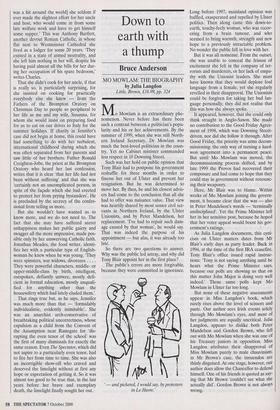Down to earth with a thump
Bruce Anderson
MO MOWLAM: THE BIOGRAPHY by Julia Langdon Little, Brown, £16.99, pp. 324 Mo Mowlam is an extraordinary phe- nomenon. Never before has there been such a contrast between a politician's popu- larity and his or her achievements. By the summer of 1999, when she was still North- ern Ireland Secretary, Dr Mowlam was much the best-loved politician in the coun- try. Yet no Cabinet minister commanded less respect in 10 Downing Street.
Such was her hold on public opinion that Tony Blair had to postpone his government reshuffle for three months in order to finesse her out of Ulster and prevent her resignation. But he was determined to move her. By then, he and his closest advis- ers had come to the conclusion that all she had to offer was nuisance value. That view was heartily shared by most senior civil ser- vants in Northern Ireland, by the Ulster Unionists, and by Peter Mandelson, her replacement. 'I've had to repair such dam- age caused by that woman', he would say. That was indeed the purpose of his appointment — but alas, it was already too late.
So there are two questions to answer. Why was the public led astray, and why did Tony Blair appoint her in the first place?
The public's errors are more forgivable, because they were committed in ignorance.
— and picketed, I would say, by protesters in Le Havre.' Long before 1997, mainland opinion was baffled, exasperated and repelled by Ulster politics. Then along came this down-to- earth, touchy-feely woman, who was recov- ering from a brain tumour, and who seemed to bring warmth, strength and new hope to a previously intractable problem. No wonder the public fell in love with her.
But it was all nonsense. From the outset, she was unable to conceal the frisson of excitement she felt in the company of ter- rorists and murderers, or her lack of empa- thy with the Unionist leaders. She must have known that they would deplore foul language from a female, yet she regularly revelled in their disapproval. The Unionists could be forgiven for taking her bad lan- guage personally; they did not realise that this was how she always spoke.
It appeared, however, that she could only think straight in Anglo-Saxon. She made no contribution to the Good Friday Agree- ment of 1998, which was Downing Street- driven, nor did she follow it through. After Good Friday, the priority was arms decom- missioning: the only way of turning a hard- won agreement into a permanent peace. But until Mo Mowlam was moved, the decommissioning process drifted, and by late 1999 the Provos had recovered their composure and had come to hope that they could stay in government without renounc- ing their weaponry.
Here, Mr Blair was to blame. Within weeks of Mo Mowlam joining the govern- ment, it became clear that she was — also in Peter Mandelson's words — 'terminally undisciplined'. Yet the Prime Minister left her in her sensitive post, because he hoped that her voter appeal would boost his gov- ernment's ratings.
As Julia Langdon documents, this cyni- cism on Ulster matters dates from Mr Blair's early days as party leader. Back in 1994, at the time of the first IRA ceasefire, Tony Blair's office issued rapid instruc- tions: 'Tony is not saying anything until he hears what the Prime Minister says, because our polls are showing us that on this matter John Major is doing very well indeed.' Those same polls kept Mo Mowlam in Ulster far too long.
But none of these negative assessments appear in Miss Langdon's book, which rarely rises above the level of scissors and paste. Our author sees Irish events solely through Mo Mowlam's eyes, and most of her judgments are equally uncritical. Julia Langdon, appears to dislike both Peter Mandelson and Gordon Brown, who fell out with Mo Mowlam when she was one of his Treasury juniors in opposition. Miss Langdon attributes their disapproval of Miss Mowlam purely to male chauvinism; in Mr Brown's case, the innuendos are thinly disguised. At one stage, however, our author does allow the Chancellor to defend himself. One of his friends is quoted as say- ing that Mr Brown 'couldn't see what she actually did'. Gordon Brown is not always wrong.


















































































 Previous page
Previous page